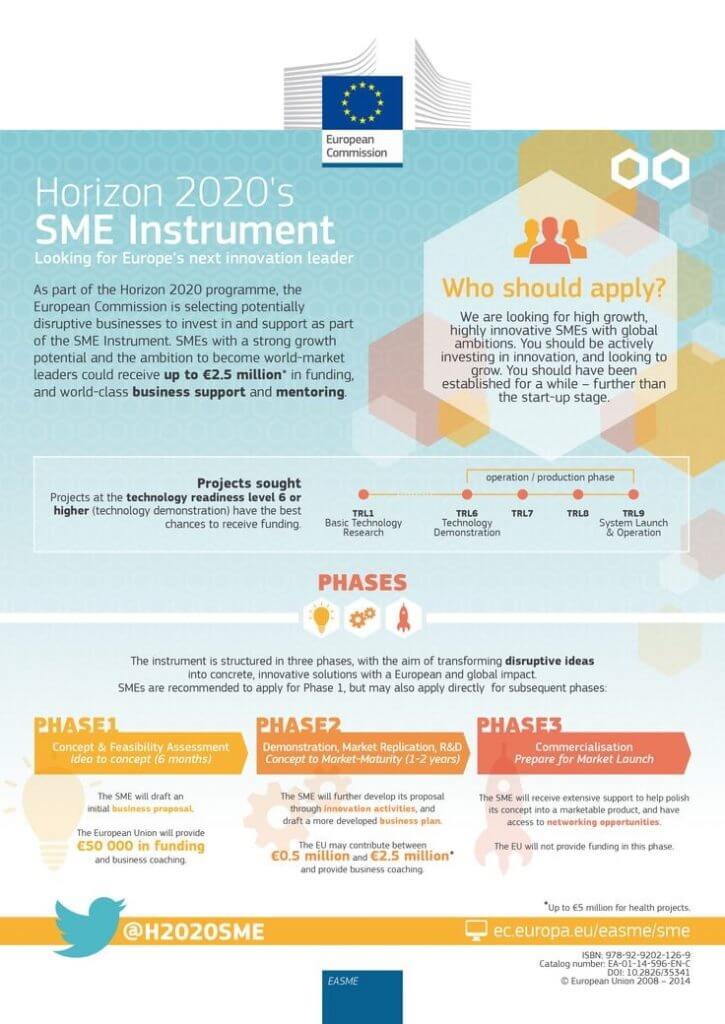


Matt Symonds
Director
After our recent presentations and workshops on accessing funding, it struck me how little businesses know about Horizon 2020 (H2020). The funding landscape has almost had the pause button pressed down upon it on since the spending review, which is why it’s so important for SME’S to know exactly what H2020 is and how it can be accessed.
Horizon 2020 is the biggest EU Research and Innovation programme ever with nearly €80 billion of funding available over 7 years (2014 to 2020) – in addition to the private investment that this money will attract, it promises more breakthroughs, discoveries and world-firsts by taking great ideas from the lab to the market.
H2020 also stimulates the participation of SMEs across the entire programme, whilst having a focus on close-to-market support.
Within this, there is a dedicated SME instrument which encourages for-profit companies to put forward their most innovative ideas with an EU dimension that can’t find funding because of their high-risk nature. The SME instrument targets highly innovative SMEs showing a strong ambition to develop, grow and internationalise, regardless of whether they are high-tech and research-driven or non-research conducting, social or service companies.
The SME instrument has a budget of approximately €3 billion over the period between 2014-2020. In addition, it promises tailored support for SMEs with ground-breaking ideas and high market potential but who are just short of a strategy or particular resources to deliver.
SME Instrument, key points to remember:

In the last round of the H2020 SME instrument, Phase 2, the European Commission received 1090 project proposals, with 45 SMEs from 19 countries selected. It’s great news that British SMEs were the most successful with seven beneficiaries, who will receive €10 million in total. Since the launch of the programme on 1 January 2014, 356 SMEs have been selected under Phase 2 of the instrument.
This still leaves plenty of scope and funding available for applications. There is a misconception amongst businesses I speak to. They believe that because many of the projects are proposed by single SMEs, it is only SMEs who can apply. This is simply not true – companies do team up and are successful, as proven with the clients that we have worked with.
The funding on offer allows companies to invest in innovation activities such as demonstration, testing, scaling up and miniaturisation. To illustrate, UK-based Avanticell Science, who assess different “drug candidates” to tackle diseases such as diabetes, cancer and osteoporosis, won funding under a Phase 1 application of the SME scheme. The funding will now allow them to progress cell-based analysis and a project focusing on 3D or additive printing to assemble cell models.
So I’d encourage you to ignore the H2020 jargon and think about what this funding could do for your project, your company and the bioscience industry.
Further information on Horizon 2020 is available here, and the SME Instrument here. The phase 1 and phase 2 deadlines for 2016 are as follows:
Phase 1: 03/05/2016, 07/09/2016 and 09/11/2016
Phase 2: 15/06/2016 and 13/10/2016
Applying for the EIC Accelerator can be a game-changing opportunity for startups and SMEs with breakthrough innovations, but the process is complex and highly competitive. We highlight common mistakes applicants make, such as unclear innovation narratives, weak commercialisation strategies, and poor preparation, and provide practical advice on how to avoid them.

The Department for Science, Innovation and Technology (DSIT) has confirmed that UK Research and Innovation (UKRI) is set to receive a substantial budget of £8.8 billion for the 2025–2026 financial year. Explore the changes, and what the 2025-2026 UKRI budget means for the future of UK Research and Innovation.

Assists organisations in accessing research and development grant funding across a range of UK and EU schemes and industry sectors.
Get In Touch